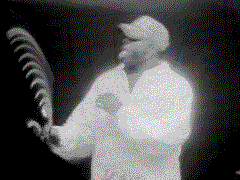The History of the Kane
Why Kappa's Have Kanes
page 3
These excerpts from The Story
of Kappa Alpha Psi tell the National Organization's
viewpoint concerning the whole cane stepping
issue:

Although cane stepping had
become one of the most popular and well-attended
activities on college campuses throughout
the country, Kappa Alpha Psi was slow to accept
this form of entertainment as a national activity.
Earlier, Senior Grand Vice Polemarch Ullysses
McBride had complained in the Journal about
the vulgar language and obscene gestures sometimes
engaged in by cane-stepping participants.
Many complained of the profanity woven into
the chants of the steppers and condemned what
they considered 'lewd and sexually suggestive
gestures that accompany some routines.' Critics
further contended that the hours spent in
step practices by chapters each week would
be better devoted to academic or civic achievement.
'I think it's more important to honor scholastic
achievement. I think the attention given to
stepping should be placed into developing
an honor roll or to recognize a group of Kappa
scholars,' was the opinion of Arthur Grist,
a member of the East St. Louis Alumni Chapter
and adviser to the Zeta Pi Chapter at Southern
Illinois University.
The Journal reported: 'What
is undeniable, however, is the widespread
popularity that stepping has attained. The
avid attraction at college to stepping has
caused shows to be propelled from mere performances
in the school dance hall to such prominent
forums as homecoming celebrations, civic auditoriums
and fraternity province meetings. Step shows
have become events that are frequently attended
by parents and relatives of collegians.'
The Fraternity succumbed to
the pressure and during the 66th Grand Chapter
meeting in Washington D.C. (in 1986 - 75 years
after the founding of the Fraternity), cane
stepping was programmed as an official item
on the Grand Chapter agenda.
Cane stepping became an official
part of [Kappa Alpha Psi Fraternity, Inc.
at the 66th Grand Chapter meeting in 1986]
and a dazzling competition was held in front
of hundreds of onlookers during a picnic in
Washington's Rock Creek Park to illustrate
the skills of the trade. Several groups participated,
performing frenzied and entertaining steps."

Members of the Beta Kappa Chapter of Kappa
Alpha Psi Fraternity, Inc.
perform in 1986 during the 66th Grand Chapter
Now that cane stepping was
openly embraced by the National Organization
of Kappa Alpha Psi Fraternity, Incorporated,
publicity of the old tradition was gaining
and many television shows, T.V. commercials,
and music video artists sought out to display
Kappa's stepping in their respective forums.
One of the first national airings came about
on February 2nd, 1989 when NBC chose members
of Kappa Alpha Psi to perform a step routine
on the Black college sitcom "A Different
World". Later, members of Kappa Alpha
Psi could be found stepping in Brother Montell
Jordan's remix of "This is How We Do
It" in the summer of 1996. Also airing
in the summer of 1996 was another display
of Kappa's stepping in an episode of FOX's
"New York Undercover".

Kappa's were again called upon to perform
in songstress INOJ's music video "Love
You Down" which ran in the Spring of
1997. WB's sitcom "Sister Sister"
ran an episode that focused on college fraternities
in the spring of 1999, and members of Kappa
Alpha Psi were chosen to perform the stepping
segment. Other music videos that feature members
of Kappa Alpha Psi Fraternity are "Woof!"
by rapper Snoop Doggy Dog which ran in the
spring of 1999, and "Imma Shine"
by Mia X which ran in the summer of 1999.

Video Clip of "Twirling" being performed.

Therefore, the tradition of the Kappa Cane
has a longstanding history that reaches back
as far the the history of the cane itself,
and sweeps forward with the introduction of
Black Greek Letter Organization step shows,
cane stepping, cane tapping, cane twirling,
and finally the acceptance of this tradition
as an official and integrated part of Kappa
Alpha Psi Fraternity, Inc. which truly sets
it apart from any other organization of its
type.
PREVIOUS
PAGE